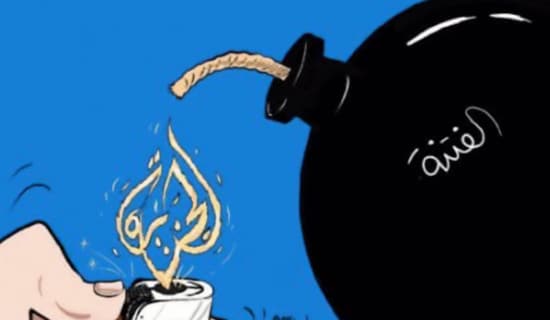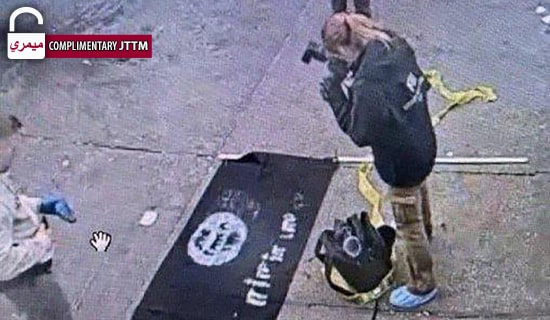The new Trump administration does not want war. Yet, if Iran becomes more aggressive and gets to the point of reaching a nuclear bomb, how can the Trump administration pursue a policy that will not need to send American troops to the Middle East?
The Islamic republic of Iran will not give up on its nuclear program. In that case, Israel will follow its Begin Doctrine, in order not to allow Tehran to get the atomic bomb. However, if Israel strikes Iran's nuclear capabilities, the Islamic republic regime will be weakened but will not collapse and will resume its subversive activities in the region and in the world.
Then, what to do?
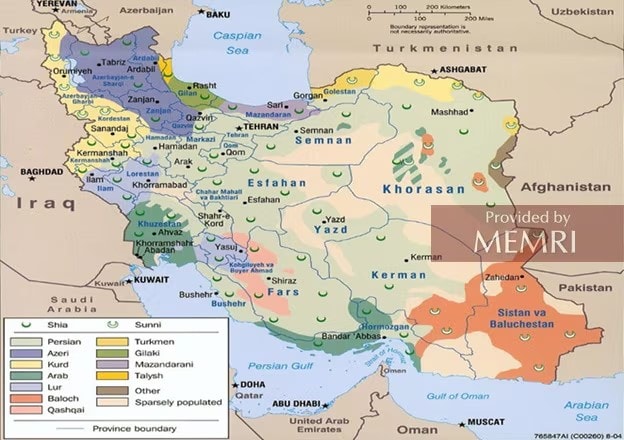
The map shows current provinces within Iran and the population of different national groups. (Source: CIA)
Non-Persian Ethnic Groups In Iran
It is worth noting that Iran's population is estimated at around 89,000,000, roughly half of whom are ethnic Persians that predominantly live in central Iran, the rest being Kurds, Balochs, Azeris, Arab Ahwazis, Turkmen, Lurs, Gilakis, Mazandaranis, etc. Hence, non-Persian ethnic minorities comprise 40 to 50 percent of Iran's population.
Several American administrations over the years have decided that the strategy to follow concerning the ayatollah's regime was to support only the Persian population, keeping the non-Persian ethnic groups out of U.S. policy.
The Trump administration should have the courage to change this policy, as supporting only the Persian ethnic group will not bring about the capitulation of the Islamic regime.
The main reasons to support the non-Persian ethnic groups – Kurds, Balochs, Ahwazis, etc. – are:
-
The non-Persian population, contrary to the anti-regime Persian one, is militarily organized.
-
The non-Persian ethnic groups, having been deprived of their rights, freedoms, and natural resources, are ready to fight and put an end to a regime which they have never recognized. The majority of non-Persians are boycotting the Islamic Republic's elections.
-
The leadership of the Islamic Republic is more scared of an uprising of the non-Persian population than of the Persian one. For this reason, during the 2022 protests, Iranian security forces have repressed Balochistan, Kurdistan, and Ahwaz in particular more brutally than the central Persian regions. It is worth noting that the 2022 protests were sparked by the killing of 22-year-old Kurdish-Iranian woman Jina (Mahsa) Amini, who was arrested by the Iranian religious police for wearing her headscarf "improperly" and died in police custody. Jina was arrested, tortured, and murdered not only because she was wearing her hijab too "loosely" but also because she was Kurdish. The protests started in Jina's hometown Saqqez, where thousands of Kurds poured into the streets across Eastern Kurdistan (Iranian Kurdistan), from which the protests spread across the country, with people burning pictures of the Iranian Supreme Leader Ali Khamenei and chanting "Death to the dictator."[1]
It is also worth noting that the non-Persian ethnic groups that constitute half of the Iranian population will never accept a "Persian Chalabi" imposed by the West to rule the country after the collapse of the regime. Furthermore, a "Persian Chalabi" would not last more than a week, as – having no popular support, especially from the non-Persian groups, he will not be able to face threats coming from countries such as Russia, China, Turkey, and Azerbaijan.
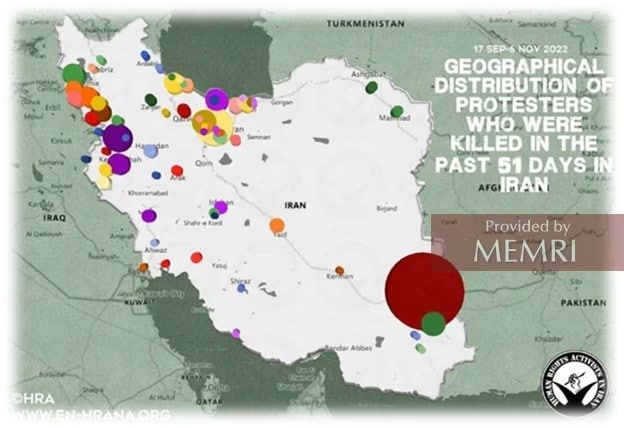
The map shows that Balochistan, Kurdistan, and Ahwaz in particular have faced brutal repression by Iranian security forces during the 2022 protests (from September 17 to November 6, 2022), compared to central Persian regions. (Source: En-hrana.org)
Secular Non-Persian Groups Are Ready To Join The West
In the past, the U.S. administrations feared that helping the non-Persians groups would result in splitting Iran into several Islamic states. However, this will not be the case. There is a golden opportunity that the West can seize. Secular non-Persian groups are ready to join the West and lead the fight without the U.S. sending its troops. The U.S. has been working with the Kurds in Iraq and in Syria. It is thanks to the Kurds, that the U.S. managed to defeat ISIS.
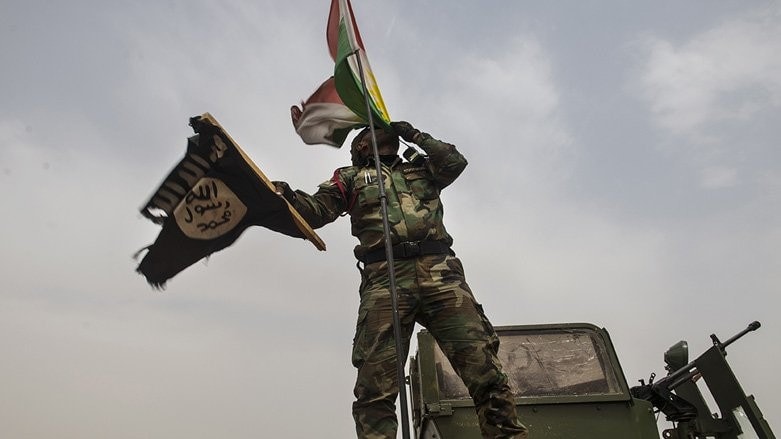
A Kurdish soldier replaces an ISIS flag with a Kurdistan flag after defeating ISIS. 15,000 Kurds died fighting jihadists in Syria and Iraq. The Kurds gave their lives to save the world from ISIS, the world should now save the Kurds from Turkey, the founder of ISIS.
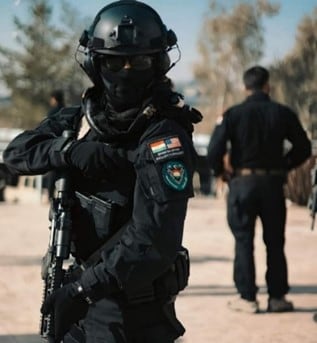
Kurdish Commandos soldier in Iraq wearing a "shoulder to shoulder" American flag patch.
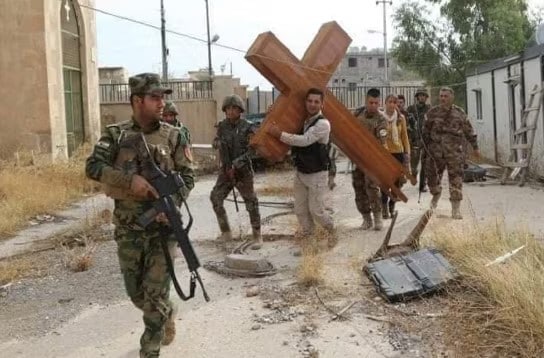
In November 2016, after liberating the town of Bashiqa in the Kurdistan Region of Iraq, a group of Kurdish soldiers decided to restore the town's church cross and bell despite many bombs having been planted inside the church.
The Ahwazis, under the leadership of Dr. Aref Kaabi, are secular and would follow the tolerant path paved in the Gulf by the UAE, which embraces an Abrahamic alliance.
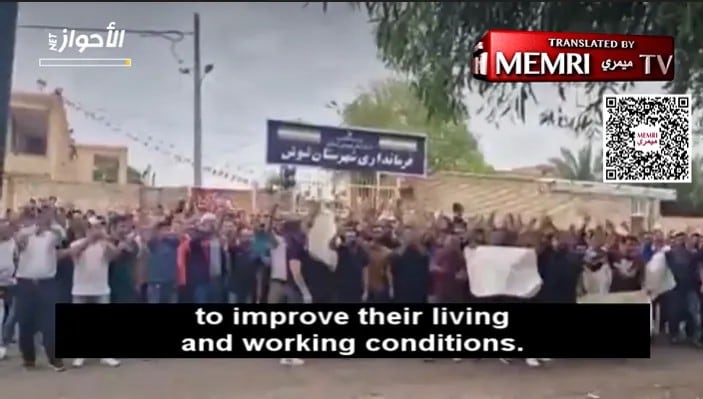
November 2024 demonstrations in Iran-controlled Ahwaz Region
The Balochs, under the leadership of the Free Balochistan Movement (FBM), headed by Hyrbyair Marri, are a secular nation. Given the importance of the Marri tribe among the Balochs, FBM leader Marri can placate the Islamist sentiments of groups such as Jaish Al-Adl.
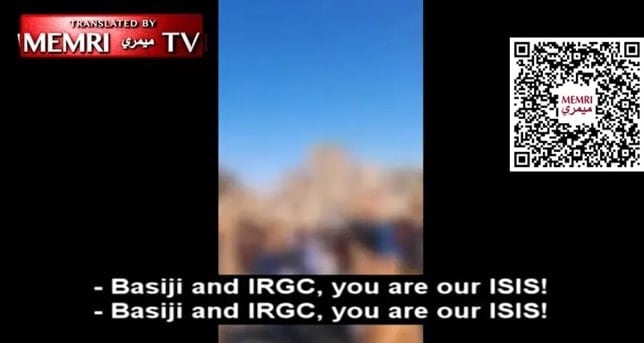
Footage of protests in Zahedan, following Friday sermons on January 20, 2023. Based on the footage, thousands of people attended the protests. The protestors chanted "Death to Khamenei!", "Mullahs should get lost!", "Basiji and IRGC, you are our ISIS!", "Khamenei – have some honor and leave the country!", and "This is the year of bloody [uprising]!" (Source: See MEMRI TV Clip No. 10079, Protesters In Zahedan, Iran: Death To Khamenei! Khamenei — Have Some Honor And Leave The Country! This Is The Year Of Bloody Uprising!, January 20, 2023)
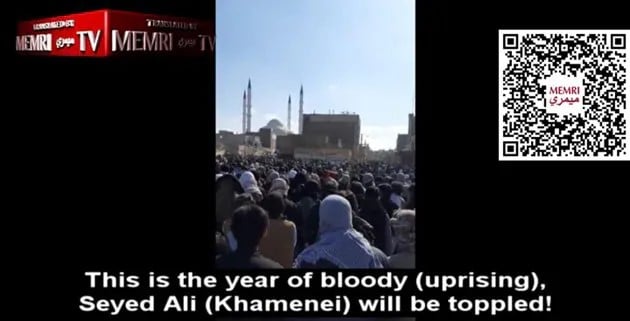
The Free Balochistan Movement, which is 40 years old, also drafted a charter, of which Article 4 states: "The Baloch national struggle is a secular movement. It is for the separation of religion from state and politics. It is for the power of reason and in opposition to any religious and ideological dogma."[2]
The movement also wrote a very detailed "Democratic Transitional Plan For Iran."[3] The plan has been presented by the Free Balochistan Movement to other ethnic groups present in Iran, such as Kurds, Ahwazis, and Azeris. At the moment, this is the only plan that finds a broad consensus.
The plan states: "The current Iranian theocratic regime is facing civil resistance from both Persians and non-Persians. Armed national insurgent groups, such as those in Kurdistan and Balochistan, seek to overthrow the regime and regain their independence. But imagine if the regime were to fall today – what would happen next?
"Would the Balochs, Kurds, Arabs, and Turks engage in conflict with a post-Mullah Iran? Would a new regime use the military to suppress civilian movements for independence in Balochistan, Kurdistan, Al-Ahwaz, and Turkic Azerbaijan? Would Iran once again descend into a protracted conflict? Could Persians resort to ethnically cleansing non-Persian regions and resettling those areas with their own population? The best way to resolve this issue and avoid internal conflict in Iran is through a Democratic Transitional Plan for Iran."
Non-Persian Groups Do Not Need The American Army On The Ground, They Need Only Political And Economic Support
These ethnic groups are ready to coordinate and fight together to end the Islamist regime. They know that this is a matter of life and death – that they will all be liberated or will all continue to be subjugated by the Iranian regime.
These ethnic groups do not need the American army to be on the ground, they can do their own fight toward liberation. In six months, they can create an army of hundreds of thousands of soldiers. Yet, they need U.S. political and economic support to mobilize the masses. It would be sufficient to have a meeting in Washington with the leaders of the above-mentioned ethnic groups to have the Islamic regime shiver in fear. There is nothing that the Islamic Republic of Iran fears as much as the non-Persian ethnic groups united.
The new Trump administration should give these leaders a chance. Economic pressure will not be enough to stop Tehran's nuclear ambitions. Washington needs partners in the region, and America's proxies are called: Kurds, Ahwazis, and Balochs. As soon as the West shows its interest, other ethnic groups will join the fight for freedom, prosperity, and liberty.
See Documents:
MEMRI Inquiry & Analysis Series No. 1796, The Free Balochistan Movement's 'Democratic Transitional Plan For Iran,' by The Free Balochistan Movement, November 25, 2024.
MEMRI TV Clip No. 11562, Free Balochistan Movement Foreign Affairs Chief Jamal Nasir Baloch: We Are Not Iranians – We Are Only Baloch; Iranian Persians Cannot Force Their Identity On Us; Non-Persian Nations In Iran Need A Cooperation Framework, Plan For Independence, And A NATO Pact, May 06, 2024.
MEMRI Daily Brief No. 673, Only United Ethnic Groups Can Defeat The Islamic Republic Of Iran, By Himdad Mustafa, November 11, 2024.
MEMRI TV Clip No. 11548, MEMRI Founder & President Yigal Carmon: The Way To Topple Iran's Islamic Regime Is For The West To Support The Freedom-Fighting Non-Persian Ethnic Minorities In Iran, November 5, 2024.
MEMRI Special Dispatch No. 11663, Balochistan Liberation Charter: The Baloch National Struggle Is A Secular Movement Against The Islamic Republics Of Iran And Pakistan, November 7, 2024.
MEMRI Daily Brief No. 668, Dr. Aref Al Kaabi, Chief Executive Officer Of The Ahwaz: I Have A Dream – I Dream Of An Independent Ahwaz, Free Of Iranian Control, By Dr. Aref Al Kaabi, October 29, 2024.
MEMRI Daily Brief No. 666, Balochistan Is A Strategic Outpost For Countering The Islamic Republic Of Iran, By Rudam Azad, October 28, 2024.
MEMRI Special Dispatch No. 11633, Prominent Baloch Leader Hyrbyair Marri Remembers Victims That Islamic Republic Of Iran Killed In Zahedan Massacre: 'Their Guns And Bombs May Kill Us, But They Cannot Silence Our Voices Forever', October 25, 2024.
MEMRI Daily Brief No. 661, Regime Change In Iran Is Possible Only By Supporting Its Ethnic Minorities, By Himdad Mustafa, October 18, 2024.
MEMRI Special Dispatch No. 11625, Prominent Baloch Leader Hyrbyair Marri: We Make No Distinction Between The Theocratic Iranian Regime And Its Proxies; When The Baloch Are An Independent Nation, We Will Never Allow Our Land And Waters To Be Used As A Conduit For Aggression Against Other Nations, Including Israel, October 20, 2024.
MEMRI Daily Brief No. 660, Renowned Baloch Leader Hyrbyair Marri: The Baloch Are Not A Minority In Iran, But Rather A Nation Under Iranian Occupation; Chinese And Pakistani Policies Are Catastrophic To The Baloch Nation, By Hyrbyair Marri, October 16, 2024.
MEMRI Daily Brief No. 656, All Eyes On Balochistan – Two Years Since The Islamic Republic Of Iran Killed Khudanoor Lajai, By Rudam Azad, October 7, 2024.
MEMRI Special Dispatch No. 11560, Two Years Since Jina (Mahsa) Amini Was Killed By The Islamic Republic Of Iran, September 16, 2024.
*Anna Mahjar-Barducci is a Senior Research Fellow at MEMRI.
[1] See MEMRI Daily Brief No. 425, 40 Days Without Jina - The Revolution Continues In Her Name, By Himdad Mustafa, October 26, 2022.
[2] See MEMRI Special Dispatch No. 11663, Balochistan Liberation Charter: The Baloch National Struggle Is A Secular Movement Against The Islamic Republics Of Iran And Pakistan, November 7, 2024.
[3]See MEMRI Inquiry & Analysis Series No. 1796, The Free Balochistan Movement's 'Democratic Transitional Plan For Iran,' November 25, 2024.


